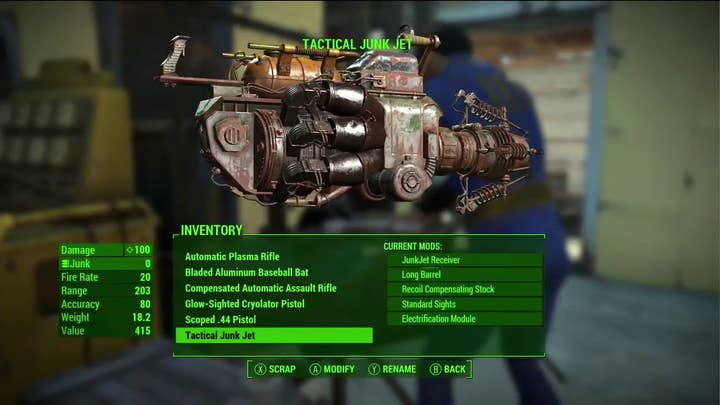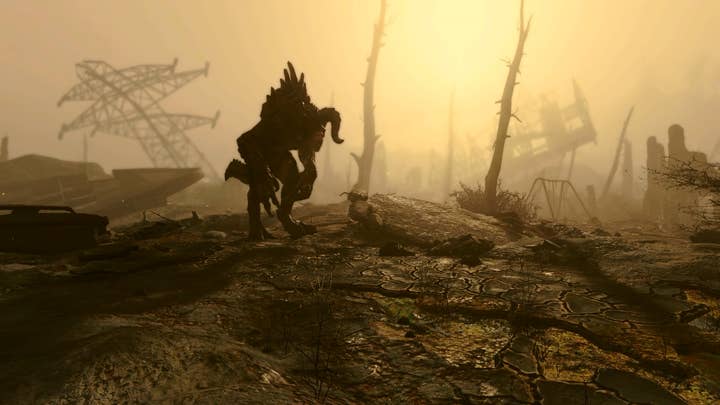Critical Consensus: Fallout 4
There are still bugs in the Wasteland, but the treasure outshines them all
Fallout 4's review embargo lifted yesterday lunchtime, the day before the game released officially in stores and unlocked on Steam. Often, that's a big red flag for reviewers, sometimes signalling the presence of a game either so bad or so broken that a publisher doesn't want the public getting wind of it in time to cancel pre-orders, or hopes that customers will be at the checkout before they've read the morning's games press.
Given that Bethesda's opulent RPGs can be a little rough round the edges at launch, there was perhaps some justification to the trepidation, but thankfully glowing review scores have largely put paid to any fears about game breaking bugs surviving the nuclear winter.
That's not to say that there aren't some issues - glitches and technical peccadilloes are mentioned in almost every review - but there's more than enough of the joy of exploration, discovery and emergent narrative to be found in the surrounds of post-apocalypse Boston to bring Fallout 4 a very healthy Metacritic rating of 89 per cent at the time of writing.
IGN's 9.5 review is up there with the highest scores, with Dan Stapleton barely able to pull himself away from the game for long enough to record his thoughts. A big fan of Fallout's world already, Stapleton found himself totally immersed in the environs of Massachusetts for 55 hours before putting pen to paper, but figures that the vast world probably still has at least double that to offer him post-review.

"I found it difficult to complete even the most basic point-A-to-point-B task without being sidetracked at least twice by enticing detours," writes Stapleton, encompassing a mechanic which any Fallout player will know well. "An abandoned comic book publisher office? How can I not explore it? Boston's famous Fenway Park? Gotta see what's become of that. A crumbling high school with heads on pikes outside? I bet there's great loot in there! Practically tripping over new discoveries like this, I feel like a kid on Easter whose parents are bad at hiding the candy."
Fallout's vast scope and sprawling sandboxes have been a huge feature of the appeal of the Bethesda reboots, and there's some debate over whether or not this is definably the 'Biggest Fallout Ever', but for Eurogamer's Dan Whitehead, who echoes IGN's praise of the sheer density of the world, it's not necessarily size that matters.
"That's the beauty of Bethesda's approach to sandbox design," says Whitehead. "You won't know until you investigate. You may stumble across a new sidequest, a diversion that takes several hours, or it may just be a self-contained place with its own sad or strange story to tell, the details of the long dead spelled out through environmental details and hacked computer logs. You may find over-powered enemies that send you scurrying back into the night, mainlining Stimpacks to stave off imminent death. You may find a teddy bear wearing glasses, reading a newspaper on the toilet."
"You may find a teddy bear wearing glasses, reading a newspaper on the toilet"
Stapleton and Whitehead also find common ground in their assessments of the new crafting system, which gives players a better reason for carting around improbably heavy rucksack's full of rusting junk and mottled plastic. By allowing you to create settlements, to knock down and remodel entire buildings, plant gardens and establish defences and lines of trade, Fallout 4 gives players the sense that they're more than a transitory gale of violence blowing across the irradiated wastes, instead becoming a genuinely civilising force making a permanent mark on the landscape.
"Fallout 4's long-term masterstroke is this deep and robust system that is all about rebuilding, putting down roots, and maybe settling down," explains Whitehead. "Once you've completed the story, once you've exhausted the side quests, once you've found and cleared every location on the map, there's still gameplay to be found in managing, maintaining and protecting these communities."
Gamespot's Peter Brown, on his way to awarding a 9, also finds time to praise the maturation the role of the player character in his surroundings, highlighting the nuanced nature of a main storyline which sees the player making very literal life and death decisions about what constitutes humanity itself and where the line is drawn between biological humans and the advanced robotics of the Fallout universe.

"Fallout 4 is the story of the 'perfect' vs the 'imperfect,'" he summarises. "(Y)our decisions influence the victories and tragedies of not just the two overarching groups, but all of the smaller ones that get caught in the middle. Picking sides and doing favours is, at first, about finding your son, but it becomes more complicated as time passes. It's not as simple as choosing between the right and wrong thing; you are almost always sacrificing something, and the decisions get harder over time."
The VATS system, which Bethsda had previously played as a time-stopping, breath-catching mechanic which could be used to pull your Brahmin-skin boots out of all but the hottest of fires, has also been rebooted, with the mode now triggering a slow-motion bullet-time rather than a full pause. Although it still offers a significant advantage to precision fire, VATS is no longer the producer of almost-guaranteed headshots it once was.
This, reviewers say, not only reflects a general improvement in the understanding of shooter mechanics for the series overall, but offers a better balance of tension, resource management and adrenaline as your survivor is forced to juggle first aid, combat and situational awareness without the luxury of a freeze-frame.
Polygon's Arthur Gies also plumps for a strong 9.5 review, again giving strong recognition to the involving questlines and inescapable spiderweb of sub-plots and incidental activities which litter the game as well as the crafting and settlement building.
"Fallout 4 has all the ambiance and history that made its predecessors such wonderful places to get lost for hours at a time, with a much more coherent set of stories within it"
"Bethesda's open-world strengths have always differed from its contemporaries in that focus on world-building and a sense of place above all else," writes Gies. "Fallout 4 has all the ambiance and history that made its predecessors such wonderful places to get lost for hours at a time, with a much more coherent set of stories within it. That Bethesda has integrated a major building and crafting tool while finally building a great-playing game almost feels like a bonus."
Whilst reviews are largely positive, the slightly overwhelmed nature of the engine tech which powers the experience is apparent to every outlet. Framerates stutter, NPCs glitch into scenery and companion AI frustrates, but generally the problems are superseded by the positives. Of the lower bracket of scores, PCGamesN's 80 per cent review finds the issues a little more grating than most, expressing disappointment that the wonkiness which has become a series hallmark hasn't been eradicated in the move to more powerful hardware. Although the game is full of welcome new toys, Matt Purslow says some traditions might be better left behind.
"While there's a brand new engine rumbling beneath its newly painted bodywork, the pieces that fit together to make this behemoth of a game are distinctly familiar," he writes. "There are a few new features that stand out like shiny chromed components, but from moment to moment Fallout 4 feels very closely related to its two predecessors: vast, packed, quirky, and holding itself together with nails and duct tape."
In a universe defined by a make-do-and-mend mentality, however, perhaps that's strangely appropriate.

